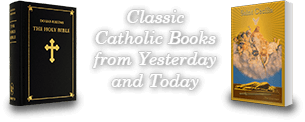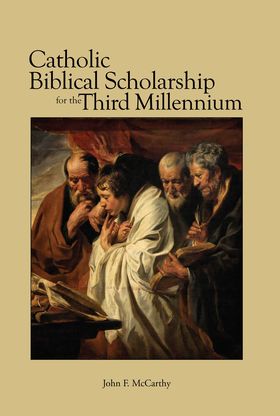Categories
Information
By. Msgr. John F. McCarthy - PB - 508 pages
It is no secret that the Catholic belief in the inerrancy of scripture has been under assault for several hundred years, and never more alarmingly-so than during the early and mid-twentieth century. This undermining of the absolute truth of holy scripture began with the protestant rebellion, and this process was intensified by the rationalist movement of the enlightenment in Europe in the 18th and 19th centuries.
Unfortunately, this trend has affected many Catholic biblical scholars so deeply that the state of affairs across a wide spectrum of Catholic philosophers, theologians, and biblical commentators displays an atmosphere of confusion and lack of clarity required for these servants of the Church to move forward confidently with their work.
Msgr. McCarthy has been involved with the Oblates of Wisdom and the Roman Theological Forum since their founding, and he has published many articles in the journal Living Tradition in defense of a truly Catholic approach to biblical scholarship, which he calls the neo-patristic method. Helping to restore confidence and holy clarity to the field of biblical science has been his lifetime commitment. This book is his prescription for an ailing field of study.
Table of Contents
Introduction
Chapter 1. Regarding Pope Benedict XVI’s Address on Biblical Exegesis and Theology of 14 October 2008 (LT 143)
Chapter 2. Some Rationalist Presuppositions of the Historical Critical Method
Part I. Regarding the Testimony of Joseph Cardinal Ratzinger (LT 137)
Part II. The Critical Philosophy of Immanuel Kant in the Background (LT 139)
Part III. The Influence of Kantian Philosophy upon Historical Criticism (LT 140)
Chapter 3. Neo-Patristic Exegesis to the Rescue (LT 41)
Chapter 4. Neo-Patristic Exegesis: Its Approach and Method
Part I. The State of the Question (LT 75)
Part II. A Neo-Patristic Reply to the Historical Critical Question (LT 76)
Chapter 5. Timely Reflections on the Science of Historical Theology (LT 169)
Chapter 6. Two Views of Historical Criticism
Part I. Historical Criticism as a Critical Method (LT 77)
Part II. Historical Criticism as a Historical Method (LT 78)
Chapter 7. A Neo-Patristic Approach to Biblical Inspiration (LT 129)
Chapter 8. Jean Levie and the Biblical Movement (LT 31)
Chapter 9. Rationalism in the Historical Criticism of Hermann Gunkel (LT 108)
Chapter 10. The Incomplete Response of Catholic Theologians to the Demythologizing Method of Rudolf Bultmann
Part I. Leopold Malavez and Heinrich Fries LT 80)
Part II. René Marlé and Joseph Cahill (LT 81)
Part III. Xavier Léon-Dufour (LT 82)
Part IV. Anton Vögtle and Ugo Lattanzi (LT 83)
Chapter 11. Toward a Fuller Catholic Response to the Demythologizing Method of Rudolf Bultmann
Part I. Leopold Malavez, Heinrich Fries, and Joseph Cahill (LT 113)
Part II. Xavier Léon-Dufour (LT 114)
Part III. Anton Vögtle and Ugo Lattanzi (LT 115)
Chapter 12. Critique of a Form-Critical Reading of Matthew One (LT 130)
Chapter 13. New Light on the Genealogies of Jesus (LT 11)
Chapter 14. The Historical Meaning of the Forty-Two Generations in Matthew 1:17 (LT 13)
Chapter 15 - Called by the Prophets a Nazorean (Matthew 2:23)
Part I – A Long-Standing Question (LT 84)
Part II – In Answer to Martin Dibelius and Rudolf Bultmann (LT 85)
Part III – In Answer to Raymond Brown (LT 86)
Chapter 16 - A Brief Commentary on Matthew 2 According to the Four Senses of Sacred Scripture (LT 134)
Chapter 17 – A Neo-Patristic Return to the Calling of Nathanael (LT 42)
Appendix
Bibliography
Index



